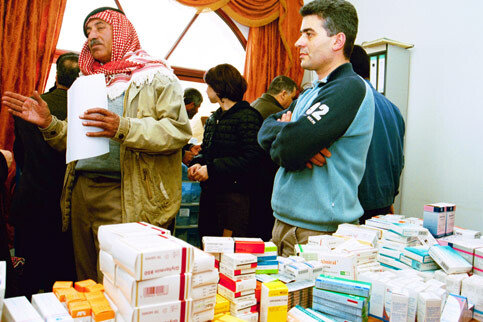The Electronic Intifada 8 May 2007

NGOs distribute medical aid to Palestinians in the West Bank. (Shabtai Gold/IRIN)
JERUSALEM, 8 May 2007 (IRIN) - A recently renewed strike by Palestinian public health workers is severely affecting services by government hospitals and primary healthcare centres throughout the West Bank, the International Committee of the Red Cross (ICRC) said on Monday.
“The longer the strike continues, the greater the likelihood of long-term health effects,” said Eileen Daly, the ICRC’s health coordinator for the West Bank.
“Primary health centres have been closed since early May, thus restricting the availability of vaccinations and the distribution of medication to the chronically ill,” she said.
“Most hospitals are now only accepting women who are fully ready to give birth,” Daly explained, adding that there is little prenatal care.
A recent statement by the Palestinian medical trade unions says hospitals will provide only life-saving services and the strike committees have been asked to be stricter in admitting cases.
Hospital admissions down
This redefining of “emergency cases” to include only people in need of life-saving care, in addition to previous limitations, such as those placed several months ago on surgery, has led to a continued decrease in hospital admissions in the West Bank.
“Hospital admissions in government facilities have dropped to as low as 32 per cent of what they were last year, and in some hospitals it is only 9-13 per cent” said Daly.
WHO official concerned
Dr Ambrogio Manenti, the World Health Organization (WHO) chief in the occupied Palestinian territory, is also concerned about the ongoing situation.
“The strike is the most serious problem in the health sector,” he said.
Manenti added that at present only emergency services are functioning and there are threats of an all-out strike.
Public sector strikes, including those by medical workers, began last August, after employees stopped receiving their salaries for six months as a result of a funding boycott by international donors in the wake of the Islamic Hamas movement’s election victory, and Israel stopped transferring the tax funds it collects for the Palestinian Authority.
The original public sector strike ended after some salaries were paid, but was renewed in February, and this month was extended and expanded to more services.
Partially paid salaries
Recent reports say Palestinian Finance Minister Salam Fiyad has partially paid some salaries through alternative funding sources, but it is unclear whether his efforts will enable public health sector employees to resume regular duties, especially as unions said the amounts given were “insufficient”.
Also, the European Commission set up a Temporary International Mechanism (TIM) to distribute “allowances” to public sector employees. However, these sums do not equate to the full salary of a doctor or skilled medical worker.
The TIM recently said it disbursed €21 million in such social allowances to Palestinian civilian public service providers.
Even so, doctors and nurses say they cannot cover their own families’ basic needs. “They receive partial salaries from different sources, because the ministry does not have money to pay them, due to the international boycott on the government,” said one Health Ministry official.
Public reaction
Another matter of concern is the public reaction to the strike. During the first strike last year, there were incidents in which angry patients attacked and threatened medical professionals, after not receiving treatment or medication.
During the current strike, aid workers say violent incidents have spread to areas that did not previously see such confrontations. Medical staff have been threatened, and furniture has been broken by patients, they say.
“The Ministry of Health provides some 70 per cent of all the health services for the Palestinian population, particularly to the poor and lower economic classes” Daly said.
This item comes to you via IRIN, a UN humanitarian news and information service, but may not necessarily reflect the views of the United Nations or its agencies. All IRIN material may be reposted or reprinted free-of-charge; refer to the copyright page for conditions of use. IRIN is a project of the UN Office for the Coordination of Humanitarian Affairs.